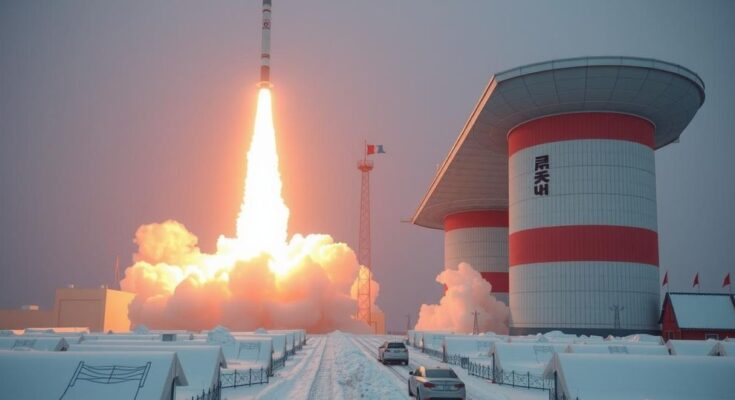North Korea conducted a missile test during U.S. Secretary of State Antony Blinken’s visit to South Korea, prompting discussions on the regime’s enhanced cooperation with Russia in military technology. Blinken condemned the missile launch and highlighted increased collaboration between the U.S., South Korea, and Japan as crucial for regional security. The backdrop includes domestic political turmoil in South Korea following the impeachment of President Yoon Suk Yeol.
On Monday, North Korea launched a missile while U.S. Secretary of State Antony Blinken was in South Korea addressing concerns regarding Pyongyang’s increasing collaboration with Russia on advanced space technology. This missile test occurred amidst escalating domestic turmoil in South Korea, highlighted by the impeachment of President Yoon Suk Yeol, who has sought refuge in his residence. During his discussions in Seoul, Blinken condemned the missile launch and underscored the need for continued cooperative efforts among the United States, South Korea, and Japan in response to North Korean provocations.
The missile, reported to have traveled approximately 1,100 kilometers (680 miles) into the sea, served as a stark reminder of the ongoing threats posed by North Korea. “Today’s launch is just a reminder to all of us of how important our collaborative work is,” Blinken asserted, promoting a unified front against Pyongyang’s military advancements. In a joint news conference with South Korean Foreign Minister Cho Tae-yul, Blinken drew attention to the troubling trend of Russia’s increasing support for North Korea, particularly in the realm of military provision and technological collaboration, following their shared antagonism towards Ukraine.
Blinken expressed alarm over the potential formal acceptance of North Korea as a nuclear state by Russia, which could undermine global efforts to curb Pyongyang’s nuclear ambitions. Bilateral intelligence indicates that North Korean forces have been involved in the conflict in Ukraine, with significant losses incurred. As Blinken moved on to Japan, Prime Minister Shigeru Ishiba echoed fears regarding the advancements in North Korean technology, illustrating regional concerns over security dynamics.
Blinken’s visit coincided with the anniversary of the January 6 uprising at the U.S. Capitol and highlighted the complex relationship between U.S. domestic politics and international diplomacy. Despite the backdrop of political strife in South Korea, Blinken commended the democratic resilience exhibited by the nation and reaffirmed U.S. backing for its political institutions amid their current challenges.
Furthermore, the meeting emphasized the continuity of U.S. foreign policy under President Biden, with South Korean officials expressing commitment to longstanding alliances and principles. Foreign Minister Cho reassured that South Korea’s foreign policy direction would remain consistent, underscoring the significance of the trilateral relationships established during previous summits. Overall, the events highlighted growing geopolitical tensions involving North Korea, regional security challenges, and domestic political struggles in South Korea, calling for strengthened alliances and diplomatic engagement.
The geopolitical landscape surrounding North Korea has been increasingly tense, especially with its missile tests and military collaborations with nations like Russia. U.S. Secretary of State Antony Blinken’s visit to South Korea is positioned against the backdrop of North Korea’s advancements in missile technology and emergent military cooperation with Russia. The visit also reflects domestic political problems in South Korea, particularly amidst the impeachment-based controversies regarding President Yoon Suk Yeol, affecting the discourse around security and international alliances. Blinken’s engagements aim to reinforce U.S.-South Korea relations and to advocate for a unified approach to regional security, particularly in the face of North Korean aggression.
In conclusion, North Korea’s missile launch during Secretary Blinken’s visit emphasized ongoing security threats in East Asia and the complex interplay of regional politics. Blinken’s warnings concerning North Korea’s collaboration with Russia signal a critical juncture in international relations, calling for vigilance and enhanced cooperation among allies. The situation in South Korea further illustrates how domestic political dynamics intersect with broader geopolitical strategies, necessitating continued diplomatic engagement and support for collaborative efforts to address these growing challenges.
Original Source: www.dawn.com




